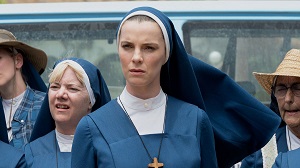
One of the no-one-else-will-be-interested-in-this films I watched last week was de Sica’s Umberto D.
One of the great postwar Italian neorealist films, shot on location in Rome, two out of the three central characters were played by non-actors. A very simple plot: Umberto D is an elderly pensioner, in debt, being threatened with eviction by his landlady. What will he do?
The film highlights the pressures of post-war Italy, although it doesn’t seem that Umberto’s dilemma is presented as anything widespread or emblematic. Yes, the film begins with a protest of pensioners demanding more from the government, but it seems that Umberto is suffering more than most, and that because of debt he’s incurred – for some reason. We don’t know why, we don’t know why he is alone, we don’t know anything about his background, only his present. It’s interesting because that lack of context meant that I, at least, had less sympathy for the character than I might have otherwise.
But nevertheless, the fellow is being treated horribly by his landlady, a striving artiste and generally terrible person who wants to remake his flat into a salon and rents out rooms in her building (including Umberto’s) to canoodling couples. His only ally is the serving girl/maid/housekeeper, a young woman (also played by a non-actor) who has gotten pregnant – and isn’t quite sure who the father is.
The movie is a series of scenes of Umberto trying to figure a way out of his dilemma. He doesn’t have many possessions, but tries to sell what he can to meet his rent. He elevates a mild sickness into a reason to go to the hospital for a few day. It’s a Catholic hospital, of course, and the scene with a sister racing through a rosary with the patients before serving a meal is priceless. He considers and attempts begging.

His only real friend is his little dog, and it’s this relationship that’s the center of the film. The dog gives him comfort, the dog is willing to help him beg, if necessary. While Umberto is in the hospital, the landlady lets the dog get loose, and Umberto’s search leads him to the pound where we see stray animals being lifted from their cages by hooks, packed into a crate and then pushed into a gassing chamber. That’s quite something.
Eventually, Umberto, it is clear, reaches the end of his rope and decides that his only way out is to get out of life completely. I won’t spoil the rest of the film for you, but just know that Umberto’s relationship with the dog plays a central role here, too. It’s his only relationship, his only tie to life, and so his love for the dog, his instinct to care for him – and the dog’s instinct to care for him and protect his own life, shape these final events.
The ending is both satisfying and not. Not because we don’t really see a resolution to the central practical problem that’s been presented to us up to this point – where is he going to live? What is he going to live on? That question is completely unanswered. But another question is answered – how is he going to live? That is – how is Umberto going to make his way in this world in the time he has left?
The answer, to quote E.M. Forster: Only connect.
Simple, but because we know the practical problems remain, not simplistic, either.
And provocative because it nudges us to look at the person next to us in line at the store or walking her dog with, perhaps, a renewed sense of compassion: what burdens are you carrying?
Anyway, I enjoyed it for the reasons above, as well as the historic aspects – I love seeing these scenes of postwar Rome, studying the scenes to absorb how people lived, comported themselves and did ordinary things like eat in a busy cafe or get ants out of the rooming house kitchen (burn them with a flaming newspaper and then just brush wave the ashes on the floor).




















